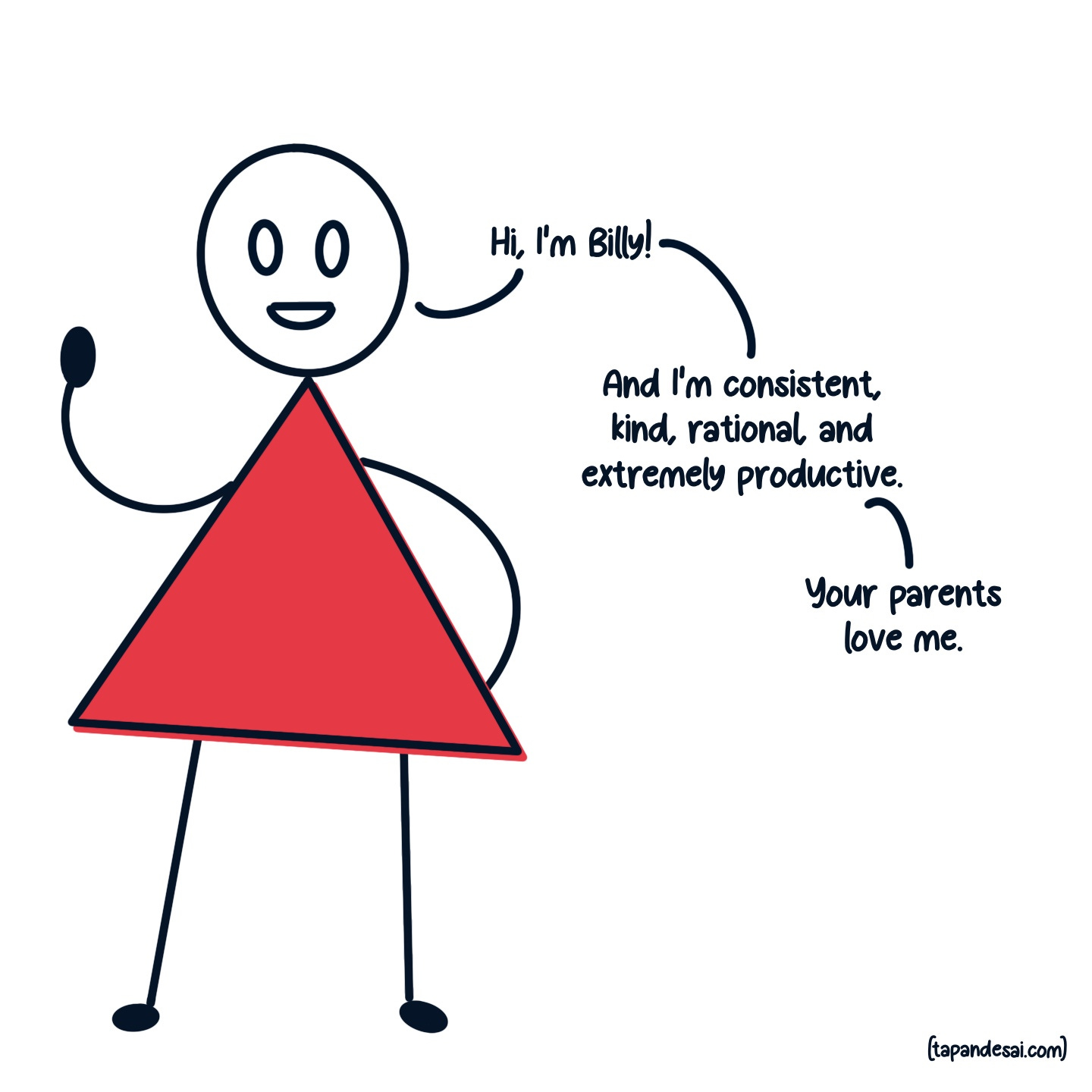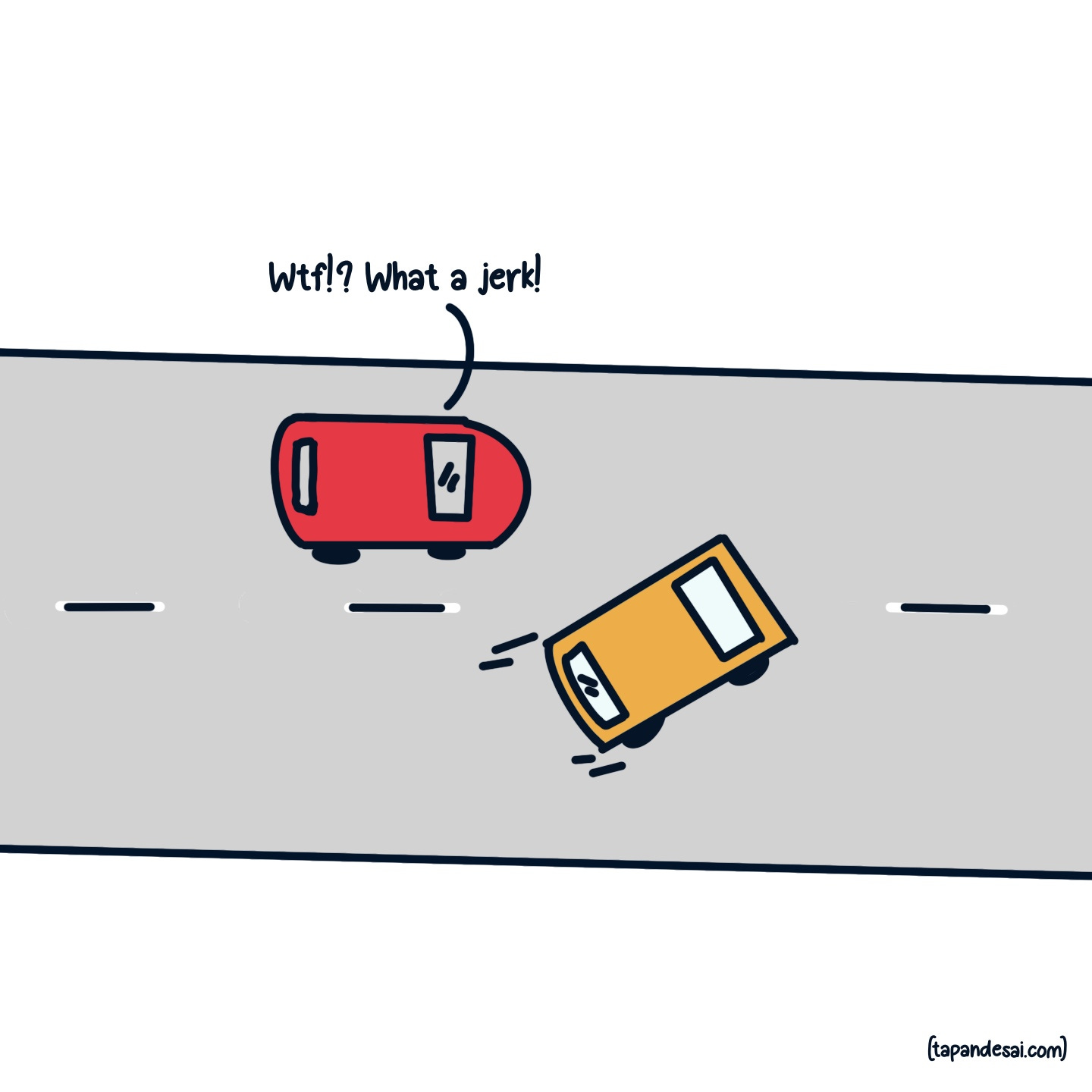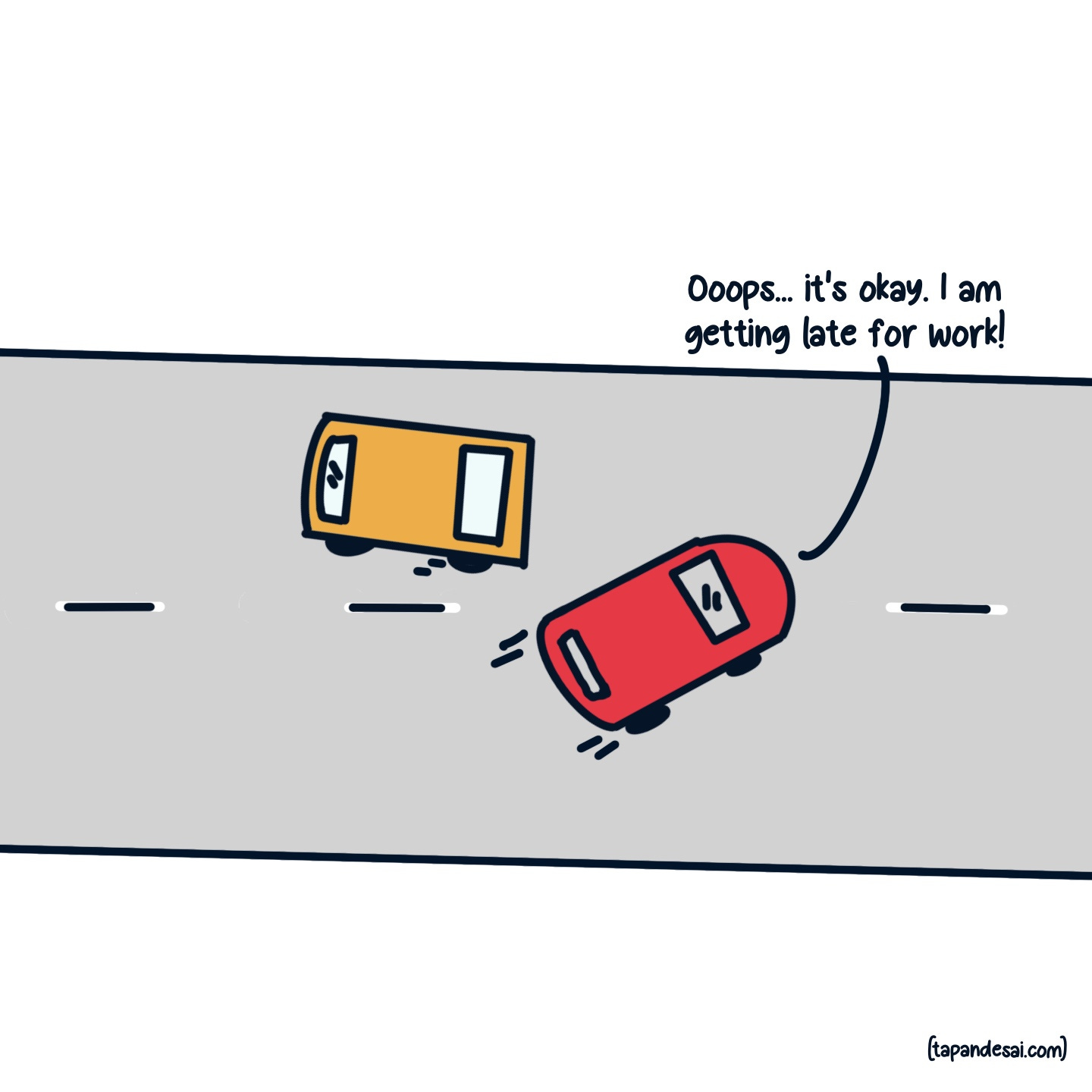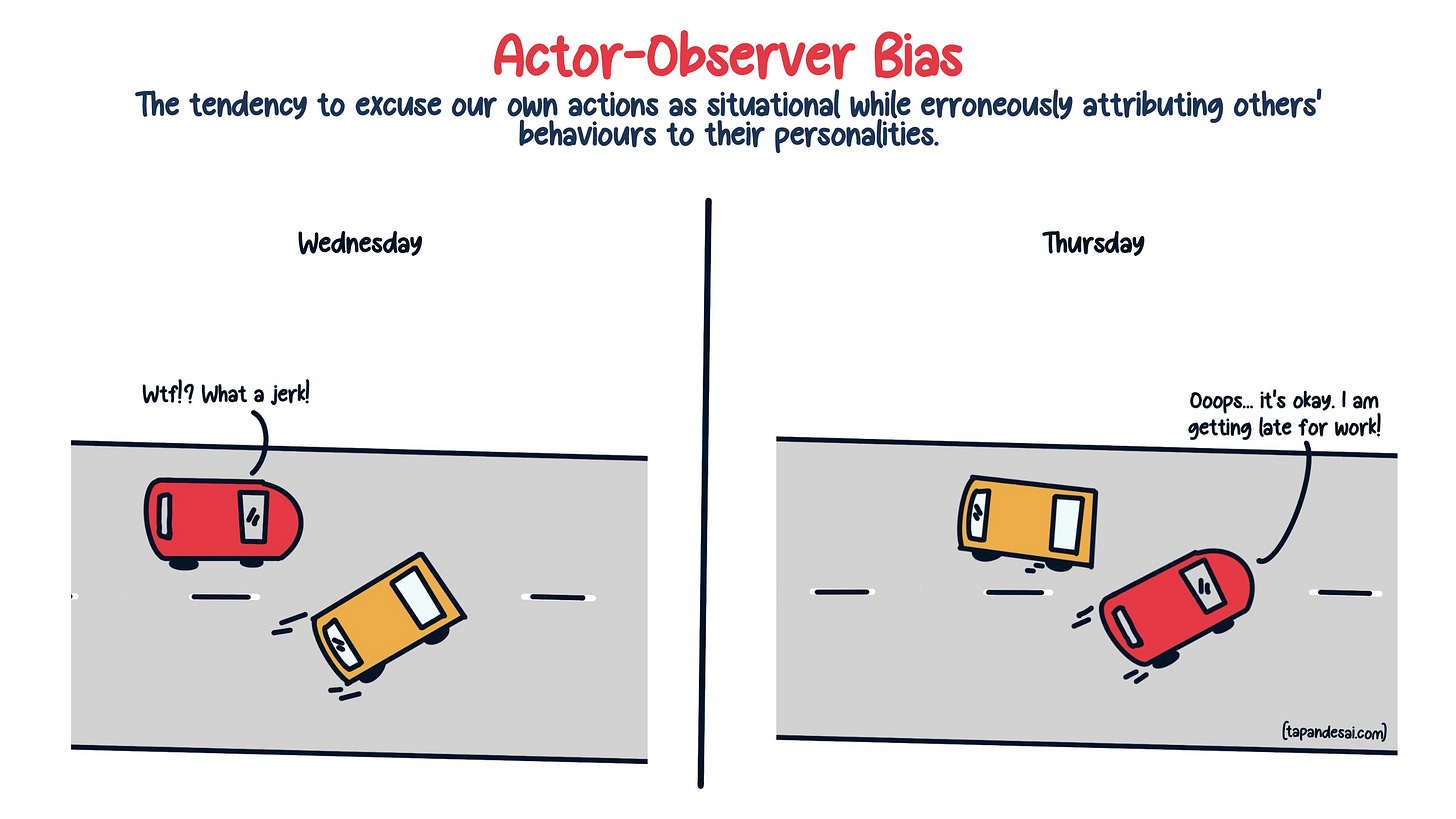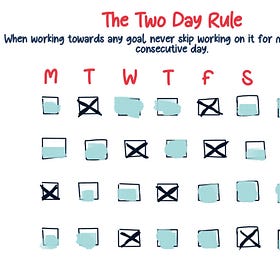I’m Not Lazy, You’re Judgemental!
Unpacking the Actor-Observer Bias and Why We're All Terrible Drivers in the Highway of Life
This is Billy. Billy is an incredibly consistent individual who strives for extreme productivity. If self-help books had a face, it would be his.
One day, Billy was driving to work after completing his yoga session, journaling, eating breakfast, and watering his plants. Yeah, when I said extremely productive, I meant it.
While driving, suddenly, a person cuts in front of Billy. WTF!?
Billy gets to the office and his day is packed with work. Tomorrow, he has a big presentation. He also has a work happy hour in the evening with his bosses attending.
Billy is conflicted but he thinks, “Just one drink. It's a networking opportunity.”
It wasn’t just one drink. Fast forward to 2 am, and Billy stumbles home.
In the morning, Billy snoozes his alarm to get some rest. When he wakes up, he is late. He doesn’t have time to work out, journal, eat breakfast, or water his plants.
“Cut me some slack, even extremely productive people slip sometimes”, says Billy to himself while hurriedly brushing his teeth and getting ready for work.
He drives speedily to the office to avoid being late for the big presentation. And then…
Same situation. A day apart. Yesterday, the cutter was "a jerk." Today, Billy justifies his rush. Why this double standard?
More importantly, have you ever found yourself in Billy’s shoes?
🚨 Quick sidebar: Enjoying the newsletter? Help me reach my goal of 3,000 readers in 2024 by sharing this post with friends, family, and colleagues! ♥️ 🙏🏽
🎭 The Brain's Blame Game: Actor-Observer Bias & FAE Fiasco
Billy's mind is ensnared by actor-observer bias and fundamental attribution error (FAE).
As actors, we blame situations or external factors for our actions. As observers, we attribute others' actions to their character or personality.
The second piece, where we are wrongly blaming the personality of another person rather than the situation, is also called fundamental attribution error (FAE).
FAE is an extension of actor-observer bias.
In a nutshell, humans tend to:
🧑🚀 Pin others' actions on their personality flaws, rather quickly.
🌪️ Excuse their own slip-ups as situational mishaps because, obviously, we're complex beings with nuanced lives.
You are at the casino watching a game of Black Jack, when a player who has a hand of sixteen asks for another card. You quip to yourself “What an idiot! He should have held at 16.” But who’s to say you wouldn’t have done the same? After all, decision-making for the self is likely to depend on cues and processes that are not available when judging the choices of others.
– Fernandez-Duque & Wifall
🤹♂️ Why it Happens: Why Our Brains Play Tricks on Us
Actor-observer bias and FAE lead us to hastily misjudge others, overlooking potential reasons behind their actions.
🛶 Mental Shortcut: The Brain's Lazy River
The human mind is always struggling to make sense of the world. That’s how evolution has wired us.
We have limited cognitive resources, and generally, our brains like to take the path that expends as little energy as possible. This leads us to take mental shortcuts (known as heuristics).
When we see someone doing something, our brains do three things:
🧠 We figure out what they're doing.
🕵️♂️ We guess why they're doing it, thinking it shows their personality.
🔄 Lastly, we apply a situational correction, assuming the contributing factors for the behaviour.
Our minds quickly jump through the first two steps but taking the third step needs more thought, so we often miss it, usually to save our cognitive resources.
This is especially true when we are busy or stressed.
🧩 Limited Information: The Jigsaw Puzzle with Missing Pieces
The actor-observer bias pops up when we don't have all the details.
When we're looking at our own actions, we've got a full backstory – our past behaviour, feelings, and reasons. So, if we're rude, we often see it as a one-off, not our usual self. But when we know little about someone else, it’s much easier to jump to a conclusion. Just like this.
Imagine one of your closest friends snaps at a waiter over a minor mistake during brunch. You think to yourself, 'They’re just having a bad day and are stressed at work because of their boss. He is really nice otherwise!' Now flip the script and imagine a post on Instagram saying Justin Bieber snapped at a waiter. You will think, 'He is a dick to the staff because he is rich!'
📣 Confirming Our Beliefs: The Echo Chamber Effect
Confirmation bias amplifies the FAE by leading us to zero in on details that affirm our preconceptions about a person's character.
So, if we label someone as selfish, we tend to attribute their behaviour to their personality, disregarding their circumstances.
Essentially, we cherry-pick facts that align with our opinions and ignore those that don't, solidifying our initial assessment.
Monthly Mulling💡
Read my article on Confirmation Bias and how Kodak's blunder owing to this bias lost them the competitive advantage in the camera race.
🕵️♂️ Bias in the Wild: Spotting the Sneaky Saboteurs
💼 Work: Jumping to conclusions about a colleague's missed deadline without considering external factors, like technical issues or urgent team support, can be unfair. They might not be lazy after all.
📊 Meetings: Assuming a quiet team member lacks interest or drive overlooks possible reasons like being intimidated by louder colleagues or needing more time to think things through. Remember, authority bias can skew perceptions.
💰 Investing: Imagine a company suddenly skyrockets to success, raking in profits. What do you think happened?
👫 Relationship: Concluding that a partner who forgets an anniversary doesn't care overlooks the pressures they might be under, from work stress to personal challenges. Such moments, in most cases, don't define their entire feelings for the relationship.
It’s important to judge the decisions of others by starting with the situation and then turning to the characteristics of the people.
👟 Stepping Out of the Bias Bubble: A How-To Guide
First impressions are often inaccurate. Those impressions will linger until you get to know people and understand their situation and the circumstances in which they acted the way they did. So, here’s what you can do:
👞 Wear their shoes: Remember that what we see is just a tiny fraction of any other person's life and that we don't see the complete picture. Where appropriate, ask if anything is bothering others.
🤔 Reflect Before Reacting: Take a moment to consider all the possible reasons behind someone's actions, not just their personality. Avoid jumping to conclusions.
🎭 Beware of Self-Serving Bias: Take care to not let preexisting bias tint the objective reality playing out right in front of you.
Thank you for reading! 🙏🏽 Knowing what to read matters more than how much time you spend reading. Get actionable insights straight to your inbox. 2x month. For free.
Until next time,
Tapan (You can connect with me on Twitter or reply to this email)


